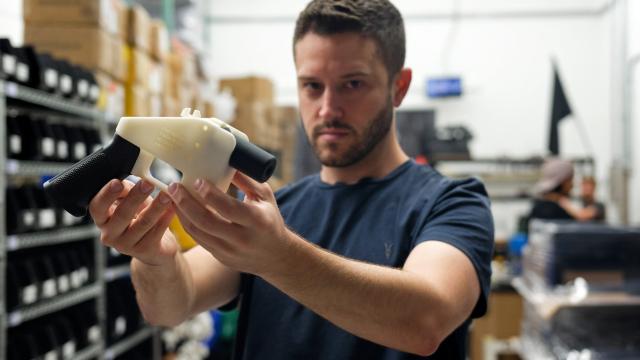The Trump administration continues to fail at making blueprints for untraceable, undetectable 3D-printed firearms free and easy for anyone to attain. On Tuesday, a U.S. federal judge ruled that Trump’s State Department could not allow plans for such guns to be posted online, claiming that it had circumvented Congress in deciding such a thing was ok. The administration even failed to offer a “reasoned explanation,” he said, for why something like this would ever be ok.
Robert Lasnik, judge of the United States District Court in Seattle, is not new to this case. He’s the same federal judge who issued an injunction against the Trump administration last July, after a settlement between the State Department and Cody Wilson, founder of Defence Distributed, reversed a long-standing State Department ban on posting 3D-printed gun plans online.
Defence Distributed is the organisation that architected these 3D-printed gun blueprints in 2012 and has been advocating for making them easy to download.
The State Department restricted the distribution of these plans starting in 2013, but Defence Distributed has been battling them in court for years. After the Trump administration reversed the State Department’s established policy last year, Washington State, 18 other states, and Washington DC sued to keep the blueprints off the internet, which is what led Lasnik to issue that injunction.
Now, he’s ruled to block the publication of the blueprints entirely, claiming that the actions of Trump’s State Department were “arbitrary and capricious… unlawful and must be set aside.” Lasnik said that the agency should have given Congress advance notice about its settlement with Wilson, rather than simply reversing any longstanding policy.
“The Department of State concluded that the worldwide publication of computerised instructions for the manufacture of undetectable firearms was a threat to world peace and the national security interests of the United States and would cause serious and long-lasting harm to its foreign policy,” Judge Lasnik said in a 25-page order.
That certainly seems like a troubling conclusion. The Trump administration said that it would “review the Washington court’s order.” Defence Distributed, on the other hand, is up in arms. The organisation has claimed that blocking the publication of its 3D-printed gun blueprints violate the First and Second Amendments. Judge Lasnik, meanwhile, claimed in his order that the Trump administration “has not attempted to justify its action as compelled by the First Amendment.”
“With today’s unprecedented ruling, a few rogue state officials have commandeered the State Department to do their unconstitutional bidding nationwide,” said Chad Flores, a lawyer for Defence Distributed. “Defence Distributed will be appealing and fully expects a swift reversal.”
(Side note: According to Webster’s Dictionary, the adjective “rogue” means “of or being a nation whose leaders defy international law or norms of international behaviour.” So Flores’ calling out “rogue state officials” is certainly an attempt at a pun, but it actually makes it sound like he’s referring to the Trump administration as “rogue,” which is the opposite of what he probably means.)
From here, the battle over whether anyone with access to a 3D-printer and basic materials should be able to download blueprints and print a deadly firearm will soldier on. Many would argue that it’s a meaningless battle, since it’s arguably harder to gain access to a good 3D printer than it is to go to a local gun show and buy an AR-15 with cash. Others would argue against this, as hundreds of local public libraries now offer access to 3D printers.
Defence Distributed itself has demonstrated how easy these 3D-printed guns are to print, and how well they can fire deadly bullets. Earlier this year, a British college student was also convicted of manufacturing a 3D-printed gun after watching how-to videos online. A prop maker at The Lion King was arrested in September, after allegedly 3D-printing guns in the prop room of the show’s Broadway theatre.
“It is baffling that the Trump Administration continued to work so hard to allow domestic abusers, felons and terrorists access to untraceable, undetectable 3D-printed guns,” Bob Ferguson, attorney general of Washington, said following this week’s order.
Somehow, this might be the least baffling thing we hear from the Trump administration this week.
